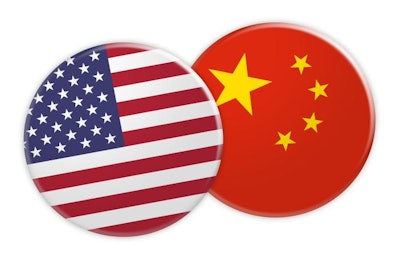
A key agricultural negotiator for the U.S. says now is the time for confrontation with China on trade issues.
At the 2018 Ag Outlook Forum in Kansas City, Missouri, Gregg Doud, chief agricultural negotiator for the Office of the U.S. Trade Representative (USTR), said there’s never a good time for conflict between the world’s second-largest and largest economies. But, he said, the issues demand action. The event was presented by the Agricultural Business Council of Kansas City and Agri-Pulse.
Existing conflict
Although trade conflict is grabbing headlines as the U.S. and China exchanged tit-for-tat tariffs in 2018, Doud said China has long denied US agriculture access to its markets. Poultry, for instance, is blocked due to concerns of highly pathogenic avian influenza – which was last a factor in the domestic industry in 2015.
The lynchpin of the current conflict, Doud said, is the Chinese government’s policy toward intellectual property. Citing a report issued by the USTR in March 2018 – Findings of the Investigation into China’s Acts, Policies and Practices Related to Technology Transfer, Intellectual Property, and Innovation Under Section 201 of the Trade Act of 1974 – Doud said the Chinese government has taken around $50 billion worth of intellectual property from the U.S. already.
Furthermore, the Chinese government’s Made in China 2025 plan calls for the country to use state-owned enterprises to position China as the global leader in high-tech industries. Doud said the aim is to displace the U.S.’s dominance of the technology sector.
China’s political decision
With the USTR estimate as its basis, the U.S. initially assessed a $50 billion tariff on Chinese goods. Emphatically, Doud said the Chinese government decided to retaliate with their own $50 billion tariff and they chose to target U.S. farmers specifically.
“They somehow believed that if they did that U.S. agriculture would be concerned enough that they would convince the U.S. government to pull back and not engage China on the fact that we needed to have these conversations addressed with regard to intellectual property,” Doud said.
Now is the time to deal with the issues
Doud said since China joined the World Trade Organization (WTO) in 2001, the U.S. and others have constantly tried to coax and cajole the country into becoming a member in good standing of both the WTO and the world economy.
This plan isn’t working, he said, and the Trump Administration recognizes it and is willing to deal with it now. There isn’t a good time for the two largest economies in the world to hash this out, but Doud said it has to happen.
“We’ve got to deal with this,” Doud said. “We’ve got to get to a point where we can relate to China in the concept of supply and demand in the world market place.”

















